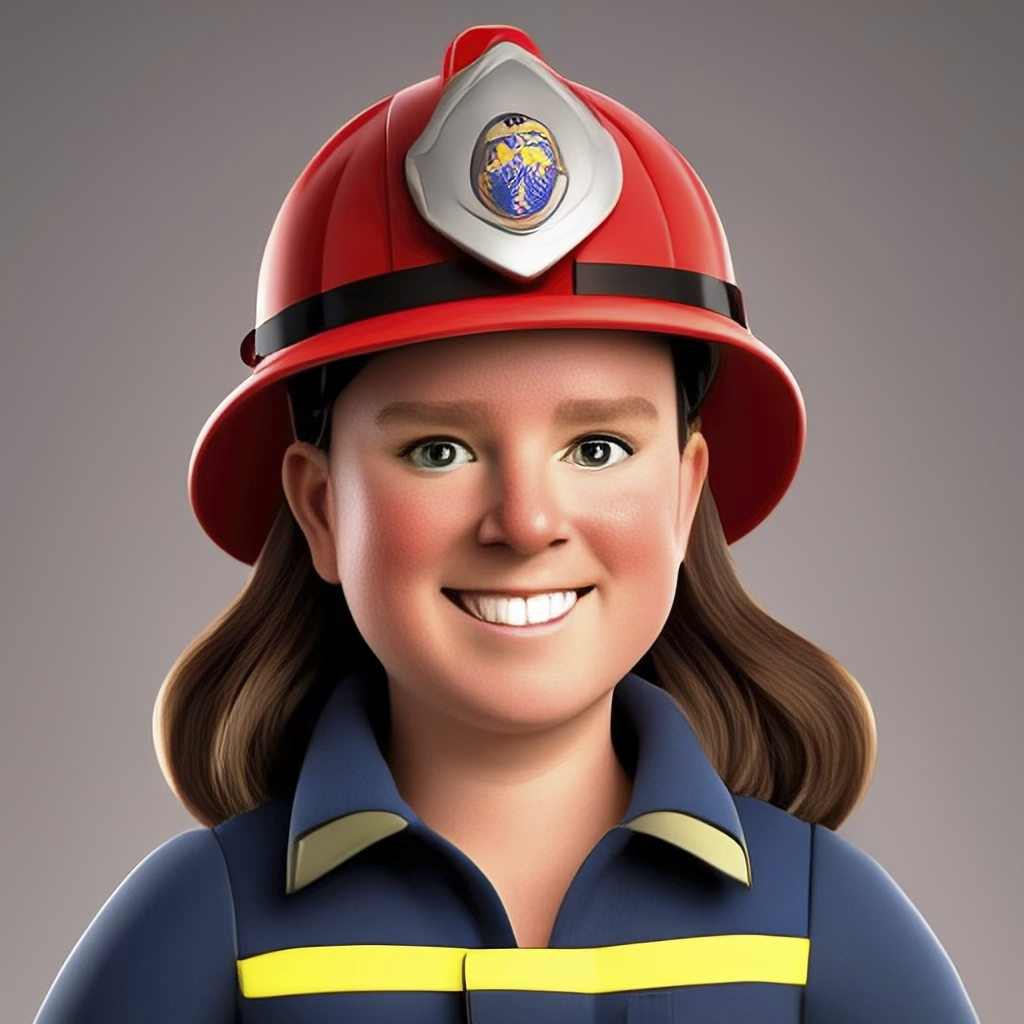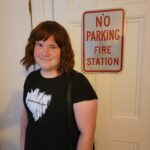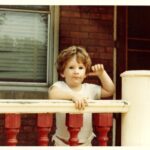As far back as I can remember, my childhood was haunted by a profound sense of fragility. While other kids were preoccupied with cartoons and playground games, I was grappling with questions of life, and death. I carried a storm inside me even as a little girl—a churning cloud of existential dread that lived under my bed, and whispered in my ear at night. I’d lie awake staring at the ceiling, wondering what the point of it all was, and when it would all collapse. Mortality wasn’t an abstract concept to me; it was a shadow that stretched across every birthday candle I ever blew out.
That constant awareness of life’s brittleness set me apart early on. I was born different in ways I didn’t yet have words for, and maybe that was part of it. Being a profoundly gifted child—with a mind that raced years ahead by default, meant I sensed truths too heavy for a young heart. I understood that people died, that love wasn’t guaranteed, that forever itself might be a lie.
I didn’t have the luxury of childhood oblivion. Instead, I had insomnia and philosophical questions I dared not voice. The weight of being different—in body, mind, and soul—pressed on my small shoulders long before I learned how to stand up straight under it.
If my inner life was turbulent, the world of my mother’s family was solid ground. They lived in a rural stretch not far from Buffalo, New York—a clan of proudly working-class Americans chasing their slice of the all-American dream. Summers meant piling into the car for the drive to my grandparents’ farm, where family reunions unfolded around campfires, under big open skies.
My uncles and cousins all seemed to drive sturdy GM and Ford trucks, vehicles built with honest American steel that gleamed under the sun. Parked in the tall grass by the old house, those trucks were a evidence to support everything my mother’s claims that they held dear: hard work, durability, and loyalty. These were people who clocked in at factories, and construction sites, who fixed their own cars on the weekends, and who barbequed under a Buffalo Bills flag that waved proudly from the porch.
The old family farm was a paradise of hands-on living. In a back corner of the yard, an antique tractor rested beneath the sagging tin roof shed, rust gathering on its iron bones, and wildflowers curling around its tires. I remember watching one of my uncles crouched in the dirt with a wrench, coaxing that stubborn machine back to life with grease-stained hands and gruff patience. There was nothing and no one in that household that couldn’t be fixed with a little elbow grease or a bit of clever tinkering. In that environment, I learned early how to coil an extension cord, drive a nail straight, and trust the calluses on my hands.
They worked hard, and they played with equal intensity. For every dawn that saw them up going to work or fixing something on the weekend, there was always a dusk that saw them cracking open beers around a bonfire or playing horseshoes until the stars came out. My mother’s family approached joy the same way they approached labor—with their whole hearts open, and no reservations. Laughter came as loud and easily as the rev of a well-tuned engine. As a child, I’d fall asleep on a pile of cousins’ jackets to the comforting sound of my relatives telling old stories and belting out off-key country songs. Under those Buffalo skies, I felt safe and, dare I say, almost free from the darkness that often gripped me when I was alone.
These were the same family members who took me to my first county fair, an event so vividly etched into my childhood memories that even now, decades later, I can still recall the electric buzz of excitement mingling with the scent of deep-fried everything. I remember standing on the bleachers, wide-eyed, as cars slammed recklessly into each other during the demolition derby, metal crunching against metal—a spectacle so gloriously chaotic, absurdly violent, and undeniably American that I couldn’t tear my eyes away. I laughed until my sides hurt, fully immersed in that wonderfully reckless moment. Yet when my father learned I’d attended something so uncouth, so profoundly blue-collar, he was utterly horrified—as if I’d somehow betrayed his carefully cultivated image simply by daring to revel in the unfiltered joy of dirt, noise, and unapologetic authenticity.
It was in that atmosphere of rough-hewn love that I found the courage to come out. At 16 years old, with shaky hands and a heart hammering like a jackrabbit, I told my aunt on my mother’s side that I was a lesbian. It wasn’t a surprise. Eventually I told my mom, and she told her entire family. I remember visiting the farm, and the moment of silence I walked into that day. My uncle paused mid-bite into his burger, gave a little shrug, and sarcastically offered, “Who here could have NOT seen that one coming.”
And everyone got a good chuckle, and that was that. They didn’t understand me fully, and they didn’t pretend to; but not a single one of them turned their back on me. In their own understated way, they let me know I was still one of them. I was still family.
My father’s side of the family was a different world entirely. They had traded the bustle of New York City for the sun-soaked suburbs of Los Angeles, but they carried the big-city mindset with them wherever they went. To them, image was everything. They were the kind of family that prized pedigree, education, and keeping up appearances, and they never let me forget it. Where my mom’s relatives saw a life to build with sweat and laughter, my dad’s relatives saw a ladder to climb—and they expected me to climb it two rungs at a time.
Manual labor was something they avoided entirely, almost as a point of pride. My paternal aunt and uncle, and all my cousins outsourced anything that involved getting their hands dirty. If a pipe leaked or a car needed an oil change, they’d rather pay a stranger to handle it. And they would watch the labor with arms crossed across polo shirts, and overpriced cardigan sweaters. I once casually mentioned helping repair a telephone jack at my my mom’s family farm, and watched their faces twist in distaste—why would anyone do such grunt work when you could just call and hire someone? In their manicured, air-conditioned world, a hammer was something you handed to the help, not something you ever touched yourself. They micromanaged businesses, and balanced ledgers, but never so much as mowed their own lawns.
They also held me to standards I never managed to meet. I was profoundly gifted, yet I struggled in the strict private schools they enrolled me in. To them, my poor academic performance wasn’t a sign that I was bored or mismatched with the curriculum; it was a personal failing, an intentional rebellion that tarnished their perfect image. I was a perplexing puzzle they couldn’t control: a child who was both too smart and, in their eyes, not successful enough. My very existence challenged their tidy worldview. Instead of trying to understand me, they chose to be ashamed of me.
The breaking point came shortly after my sixteenth birthday, not long after I had come out to my mom’s side. My father’s family summoned me to what can only be described as a full-scale intervention. I remember sitting stiff-backed in my aunt’s living room in California, the air stifling and still, as a circle of well-dressed relatives fixed me with hard stares as I sat, dressed in some frayed green cargo shorts, my favorite t-shirt that had been worn out at least a year ago, and some Teva sandals. They spoke in careful, lowered tones, as if discussing a business deal or a dearly departed – but it was my life they were dissecting.
They informed me that my lifestyle choices, and so-called identity were unacceptable. I was to keep my situation a secret at all costs, they said. If I insisted on being that way, I must never speak of it outside those walls, and never find a partner, or speak openly about this as it will bring shame to the family.
Their words grew sharper as the hours wore on. One by one, my relatives—the people who were supposed to love me—stood up and pronounced judgment. I was selfish. I was an embarrassment. I was even, in the venomous hiss of my aunt’s voice, disgusting. My father nodded each and every time someone stated something they hated about me. I sat there, hands clenched into fists on my knees, feeling heat rise in my cheeks. But I would not cry for them. I would not bend.
When they finally paused, expecting to see me broken and obedient, I quietly rose to my feet. My chair scraped gently against the carpeted floor in the silence. I looked around at each of those faces—people who shared my blood but had never truly seen me—and I said, as evenly as I could, “I have better things to do with my life than live it for you.” Then I walked out the front door, letting it shut firmly behind me.
In that moment, I chose love and authenticity over fear and appeasement. I walked away from their money, their expectations, their conditional affection—and I walked straight into freedom (and a Hardee’s restaurant, where I ordered a double cheeseburger). It was the day I had lost half of my biological family, and found myself at a Hardee’s in Claremont, California, trying my best to figure things out. They had never really been my family in any way that mattered. Their absence in my life hurt far less than the expectations I would have had to aspire to, if I sought their approval. I realized as I left that I had always known where I belonged. I wasn’t the heir to their hollow legacy; I was my mother’s daughter, forged in Buffalo steel and honest mud.
As I grew into adulthood, my mother’s side of the family, which had once stood as an unshakable foundation in my life, gradually unraveled beneath the quiet devastation of alcoholism; first my uncle, and then one of my beloved aunts, succumbed far too early to their addictions. Their deaths fractured something intangible yet profoundly real—the warmth and closeness I’d always counted on—and as if in mournful response, the farm itself slipped through my fingers.
Despite my earnest offer to purchase it in cash, above asking price, my cousin made it painfully clear that the family farm could no longer belong to any of us, as though our shared memories had become an unbearable burden rather than a treasured heritage. He allowed me to visit one last time, then as the day was nearing the afternoon, he told me to move my car outside the gate. He locked the gate behind all of us, sold the farm, and I haven’t been back since. Since that day, my connection to them has dissolved into silence; the ties that once bound us frayed beyond repair. It was as if time froze in the very instant of loss, leaving a much younger version of me forever standing in a quiet field of ghosts, still waiting—perhaps futilely—for a reunion that will never come.
These days, I wake up each morning on a patch of land nestled in Vermont’s Green Mountains, breathing air that smells of hay and wildflowers. This is my own farm—a life I built from the ground up, far from any suburban expectation. On these ten acres of rolling pasture and forest, I’ve found the kind of peace that once felt more myth than reality. Here, I rise with the sunlight on my bed, and I watch the mist lift off the fields as I sip coffee that tastes like hard-earned freedom. Every task on this homestead is mine to tackle, and every square inch of it carries my fingerprints, my footprints, and my memories. It’s a place I can comfortably live without curtains or blinds on my windows. I want to look out, all the time, to stay connected to the outside world, but at a distance, at my pace, and only on my terms. No exceptions.
My John Deere tractor sits in the barn, its green-and-yellow paint catching the morning light as faithfully. Its massive rear tires and undercarriage are caked with mud and gravel from to the long days of plowing snow, hauling trees to plant, and stray grass clippings from towing the mower deck through the fields. My blue Ford F-150 pickup truck waits in the barn along side it, with the back seat full of changes of clothes and camping gear, waiting patiently for the next last-minute adventure where I drop everything and just go.
These machines aren’t just vehicles to me; they are trusted companions in my everyday work. I maintain my own equipment, just as I watched my uncles do, only this time as the adult, I’m the one getting dirt and grease under my fingernails.
When the work is done, I’ve learned to let myself play and rest without guilt. As dusk falls on the farm, I trade my work gloves for a CD player, my laptop, or a good book, oftentimes a combination of these. There are evenings when I dance barefoot in the grass, music from the radio mingling with the chorus of crickets. Other nights, I will be inspired to cook something really incredible, and Amelia and I will have it for dinner. In those moments, my muscles ache in the best way, and my heart feels full. I have built a home where my authentic self is not just accepted but celebrated, where love is open and easy, and where the boundary between working hard, and savoring life is as natural as the shift from day into night.
Sometimes, in the quiet of a starry night, I let myself remember the girl I could have been if I’d played by everyone else’s rules. I picture a version of me still stuck in that gilded cage of expectations—lonely, false, a ghost wearing someone else’s smile. I ask myself if appeasing them, if trying to live up to their idea of who I should be, would have been worth it. Was any of that sacrifice ever worth the cost?
In the end, the mountains finally won. The open sky, the honest earth, the life built on my own terms—these things claimed me, and I let them. I stopped running from who I am meant to be. I stopped trying to perform a role that was never mine. Here in the shadow of these mountains, I’ve found something better than what I lost. I found peace. I found myself.
When I finally crawl beneath the covers—bones aching in that quiet, familiar way, heart a little too full for words. The house is still, save for the hum of the refrigerator, I fold into myself like muscle memory. No fanfare, no audience, just me in an old shirt and panties—tired, unguarded, soft in all the places the world tries to harden.
I curl up on my side the same way I always do, pulling my knees toward my chest, arms wrapping instinctively around my own body. One hand rests gently across my breast, the other tucked underneath, cradling me with the tenderness I used to think had to come from someone else. But tonight, like so many nights before, I’m my own comfort. My own shelter. My own bra. And I lie there breathing—slow, steady, and wholly mine—knowing that this, this quiet moment of holding myself together, is a kind of womanhood no one ever taught, yet every one of us somehow knows.










Leave a Reply